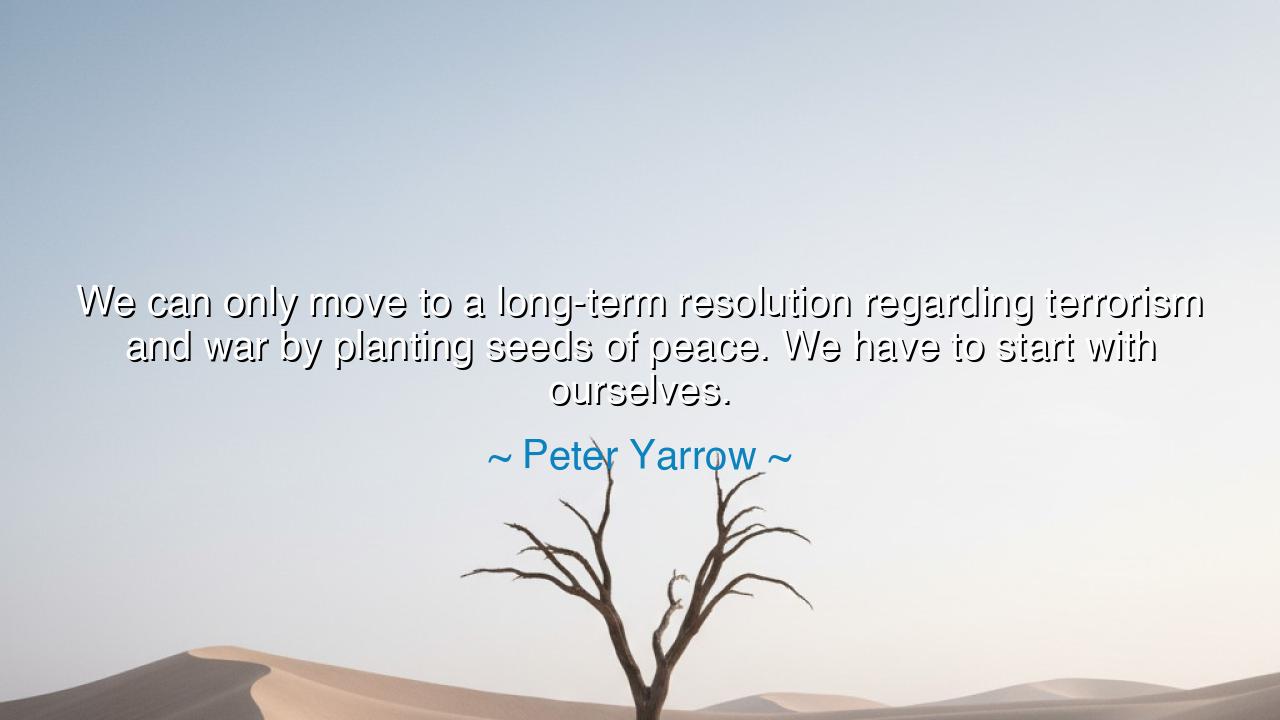
We can only move to a long-term resolution regarding terrorism
We can only move to a long-term resolution regarding terrorism and war by planting seeds of peace. We have to start with ourselves.






Hear the words of the singer and peacemaker Peter Yarrow, who declared: “We can only move to a long-term resolution regarding terrorism and war by planting seeds of peace. We have to start with ourselves.” These words are not mere poetry, but a commandment of the heart, forged from the understanding that violence cannot be overcome by violence, and that no true peace can be won by the sword alone. It is a call to the most ancient wisdom: that great transformations in nations begin first in the soul of the individual.
To “plant seeds of peace” is to acknowledge that peace is not built in an instant, nor forced by decree. Like the farmer who sows grain into the earth, one must labor patiently, nurture carefully, and trust the slow but certain growth of harmony. Each act of compassion, each word of reconciliation, each effort to understand another becomes a seed. And though small at first, these seeds grow into mighty forests that shade entire generations. Yarrow’s insight is that without these seeds, there can be no lasting resolution to the cycles of terrorism and war that plague humankind.
Consider the example of Mahatma Gandhi, who faced the might of the British Empire. His weapon was not the sword, nor the rifle, but the seed of nonviolence. By planting within himself and within his people the discipline of peace, he transformed a nation’s struggle into a moral revolution. Where violence might have brought ruin, the seeds of peace brought independence and dignity. Yarrow’s words echo Gandhi’s example: it is only when we cultivate peace within that we are strong enough to resist hatred without.
The tragedy of terrorism is that it is born not only of ideology, but of despair and rage. To end it, nations often reach first for armies, yet the deeper wound is left unhealed. The true answer, Yarrow reminds us, lies not only in defense, but in addressing the roots: injustice, poverty, alienation. Planting peace is to build schools where there is ignorance, hope where there is despair, and bridges where there are walls. Without such sowing, the weeds of hatred grow back again and again.
Yet Yarrow also says: “We have to start with ourselves.” This is the hardest truth. It is easy to demand peace from leaders and nations, but far harder to cultivate it in our own hearts. How often do we rage against neighbors, speak with cruelty, or let anger fester in our souls? These are the seeds of conflict at the smallest level. If we cannot resolve the wars within us, how shall we expect the world to lay down its arms? To start with ourselves is to live the very peace we wish to see.
History also shows us the opposite: when leaders failed to sow seeds of peace, the world suffered. After the First World War, the victors imposed punishment upon Germany rather than reconciliation. The seeds sown were not of peace, but of bitterness and vengeance, and from those seeds grew the horrors of the Second World War. Yarrow’s warning is clear: without planting peace at the root, no resolution is ever secure.
O children of tomorrow, learn this wisdom: every smile offered in kindness, every quarrel ended with forgiveness, every injustice resisted with love is a seed of peace. Do not despise these small beginnings, for they are the foundation of a world without war. Make your own heart the first garden, tend it daily, and from its harvest let others be nourished. In this way, the great chain of peace extends outward—from the self, to the family, to the community, and finally to nations.
Thus the words of Peter Yarrow shine as both prophecy and instruction: lasting peace begins not with treaties, but with the planting of seeds. Plant them in yourselves, plant them in others, and one day, when the harvest comes, the world shall know a resolution to terrorism and war that cannot be broken. For peace that grows from within can never be taken away.






AAdministratorAdministrator
Welcome, honored guests. Please leave a comment, we will respond soon